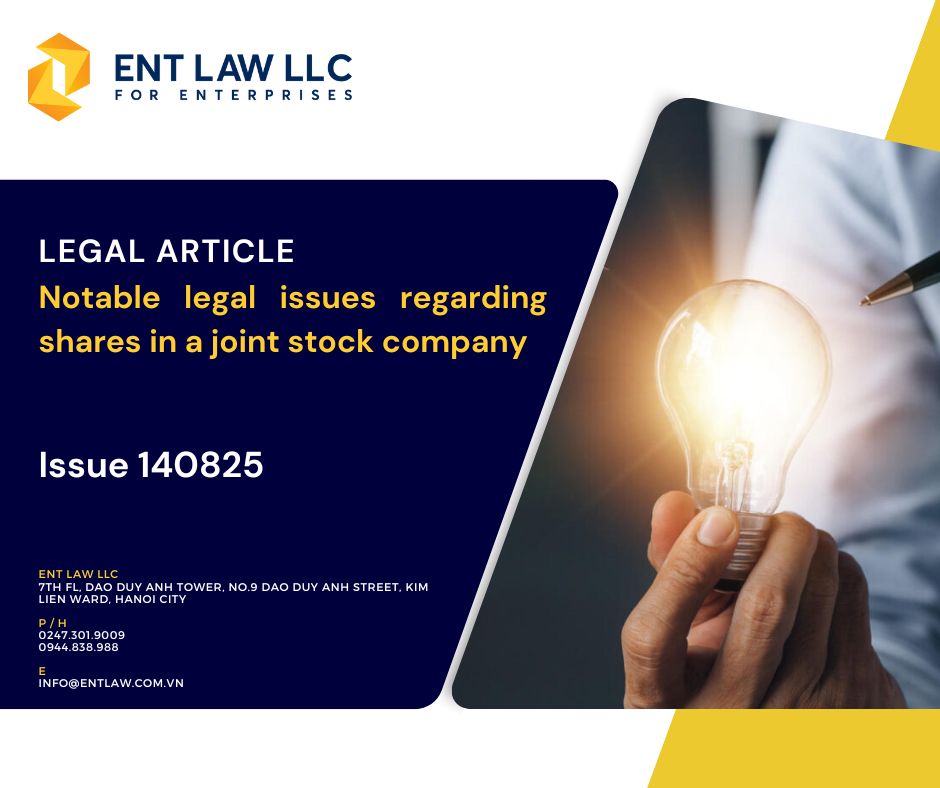Dear Valued Clients,
Under the Law on Enterprises 2020, as amended in 2022 and 2025 (“LOE”), the charter capital of a joint stock company (“JSC”) is divided into equal units called shares. Shares determine the rights and obligations of shareholders, including their entitlement to participate in the company’s management and administration, and to share in the benefits of its business activities.
Shares are classified into distinct types, each subject to specific rules on issuance, transfer, and repurchase. For a comprehensive overview of the legal framework governing shares in a JSC, please refer to our dedicated article.
1. Types of Shares
The Law on Enterprises (“LOE”) classified shares in a joint stock company (“JSC”) into two main types: ordinary shares and preference shares. Each type has distinct legal characteristics and associated rights, as set out below.
i. Ordinary shares
Ordinary shares are mandatory for all JSCs. Holders of ordinary shares (“ordinary shareholders”) are entitled to fundamental shareholder rights, including:
- Attending and voting at the General Meeting of Shareholders (“GMS”);
- Receiving dividends;
- Freely transferring shares, except for certain restrictions applicable to founding shareholders during the first three years; and
- Receiving residual assets upon the company’s dissolution or bankruptcy
ii. Preference shares
Compared to ordinary shares, preference shares grant enhanced rights in relation to dividends, voting, or capital redemption. Common categories include:
- Dividend preference shares: entitled to higher or more stable dividends;
- Voting preference shares: carrying additional voting rights (only available to founding shareholders or State-designated organizations);
- Redeemable preference shares: allowing the holder to require the company to redeem the shares under certain conditions.
It is worth noting that preference shares may be converted into ordinary shares pursuant to a resolution of the General Meeting of Shareholders (“GMS”); however, the conversion of ordinary shares into preference shares is not permitted.
2. Repurchase of shares
The repurchase of shares is an important mechanism that enables a JSC to proactively adjust its shareholder structure and charter capital. This process is governed by Articles 132 and 133 of the Law on Enterprises (“LOE”) and takes two principal forms.
i. Repurchase at the request of a shareholder
A shareholder may request the company to repurchase his or her shares if he or she objects to a resolution on the reorganization of the company or a change to shareholder rights and obligations. Key procedural requirements include:
- The request must be made in writing within 10 days from the date the resolution is adopted;
- The company must complete the repurchase and payment within 90 days from the date of receipt of a valid request; and
- If the parties cannot agree on the repurchase price, they may engage an independent valuation organization to determine it.
ii. Repurchase at the decision of the company
The Board of Directors (“BOD”) may resolve to repurchase up to 10% of the total number of ordinary shares issued within any 12-month period. A repurchase exceeding this threshold, or involving other classes of shares, requires prior approval from the General Meeting of Shareholders (“GMS”).
In any case, the total number of shares repurchased by the company must not exceed 30% of the total ordinary shares in circulation, together with part or all of the dividend preference shares already sold.
3. Transfer of shares
i. Transfer of ordinary shares
As a general principle, ordinary shares are freely transferable. However, ordinary shares held by founding shareholders shall only be trransferred to non-founding shareholders after three years from the date the company is issued its Enterprise Registration Certificate (“ERC”). Any earlier transfer requires the prior approval of the General Meeting of Shareholders (“GMS”).
ii. Transfer of preference shares
According to the Article 133 LOE, preference shares are subject to the following transfer restrictions:
- Voting preference shares: These shall not be transferred to others, except pursuant to an effective judgment or decision of the Court, or under the provisions of law on inheritance. In particular, voting preference shares of founding shareholders are valid for a maximum of 3 years from the date of issuance of the Enterprise Registration Certificate, and after which they shall be converted into ordinary shares.
- Dividend preference shares and redeemable preference shares: There is no statutory restrictions on their transfer. However, the company’s charter may establish its own conditions or restrictions. Therefore, before conducting a transfer transaction, shareholders should carefully review the charter and comply with any internal approval procedures or mechanisms.
Note:
For all share transfers, the parties must prepare a share transfer contract, update the register of shareholders, and submit a personal income tax declaration (if the transferor is an individual) for each occurrence within 10 days from the date the tax obligation arises. Failure to complete these procedures may result in the transferee not being recognized as a lawful shareholder.
As usual, we hope that our Clients find this article useful and look forward to working with you in the near future.
Sincerely,
ENT Law LLC



Issue 140825 – Notable legal issues regarding shares in a joint stock company
Dear Valued Clients, Under the Law on Enterprises 2020, as amended in 2022 and 2025 (“LOE”), the charter...
Aug
Issue of July, 2025 – Beneficial owner under Law on amendments to Law on enterprises
Dear Valued Clients, On June 17, 2025, the National Assembly officially passed Law No. 76/2025/QH15 amending and supplementing...
Jul
Issue 020725 – Legal regulations on the suspension and liquidation of investment projects in Vietnam
Dear Valued Clients, In the context of Vietnam’s ever-evolving and dynamic investment environment, investors may need to temporarily...
Jul
Issue 010725 – Procedure for Capital contribution, share purchase, and capital contribution purchase by foreign investors in Vietnam
Dear Valued Clients, In the context of deepening international economic integration, Vietnam continues to be an attractive destination...
Jul